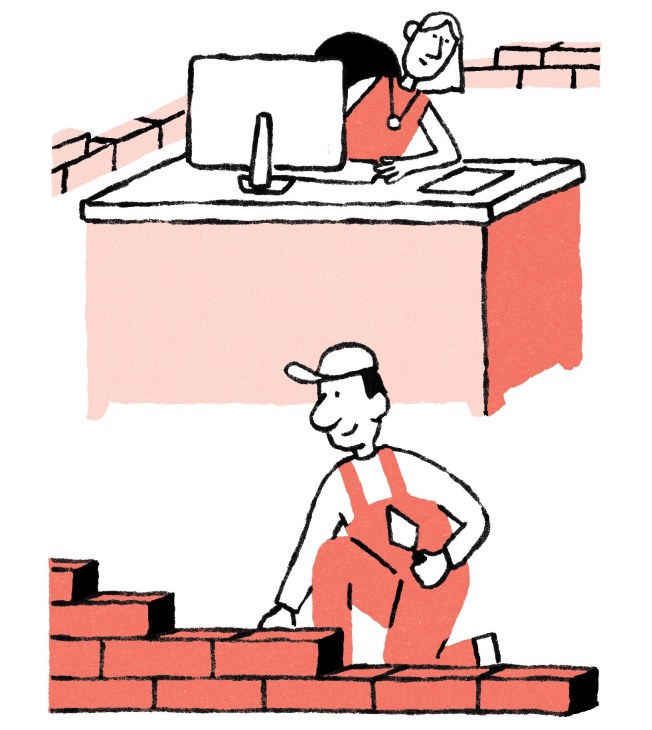20 hard-earned business lessons from entrepreneurs at the top of their game
Jumpstart your progress in any field with these smart tips from businesspeople creating extraordinary impact with hard-won wisdom.
Want to build a business that works? We have gathered 20 lessons from global entrepreneurs and industry leaders at various stages of their journeys. In candid conversations on Monocle Radio, they shared with us their thoughts on what it takes to succeed, from carving out a niche and building a purposeful brand to knowing when to trust your gut or pivot with grace. The ideas here span six continents, with sharp insights from founders and CEOs in fashion, media, manufacturing and robotics. Some spotted overlooked markets, while others turned to the past, stacking skills to create something new. What unites them is a willingness to rethink the obvious, be bold and keep building, whatever the size of the idea or the field they’re in.
For more smart thinking and fresh perspectives, tune in to Monocle Radio’s weekly shows The Entrepreneurs and Eureka, your blueprint for the best in business, retail and leadership.
1.
Pursue what challenges you
“I didn’t set out to start a beauty brand. Cutting through in such a saturated market is incredibly challenging – it’s a steep hill to climb. But I saw problems that were worth solving and it felt meaningful to me to try. I decided that I wanted to bring new thinking into the industry and make it more sustainable, introducing products that combine nature and efficacy.”
Emma Lewisham
Co-founder and CEO of Emma Lewisham skincare

2.
Value traditional techniques
“Greece has an incredible jewellery heritage that isn’t celebrated enough. I have always thought that ‘Made in Greece’ should mean something, just as ‘Made in Italy’ does. Seeing the artisans of the country at work their craftsmanship, the goldsmithing techniques – made me realise that we could create something beautiful that was rooted in culture and truly worth sharing.”
Alexia Karides
Co-founder and CEO of London-based jewellery brand Ysso, whose handcrafted pieces are made in Athenian workshops
3.
Digital doesn’t have to mean disposable
“Speed tends to be prioritised over quality in digital journalism. Newspapers often save their well-researched long-form content for print, while digital news outlets churn out quick, low-quality updates. We saw that there was demand for depth over volume amid the relentless breaking-news cycle. The more polarised society is, the greater the need for a product that takes its time.”
Tav Klitgaard
Co-founder and group CEO of Danish digital-only news outlet Zetland
4.
Turn a pain point into match point
“As a tennis player, I was always annoyed by how much time I would spend picking up balls instead of actually playing. So we built an autonomous robot that does it for you. Other players immediately supported us because it’s a common frustration in the sport. We knew that we had something that would do well, not just in the US but in all big tennis markets.”
Haitham Eletrabi
Co-founder and CEO of Alabama-based company Tennibot, which makes ball-collecting robots for racquet sports

5.
Take advantage of overlooked market opportunities
“Growing up in Oaxaca, I would find delicious mezcal everywhere. But many people in Mexico City dismissed it as a cheap peasant drink. I never imagined that it would become a global phenomenon but once the big chefs in the capital started talking about it, tourists came and everyone wanted a taste. At the start I just wanted to keep my grandfather’s recipe alive.”
Yola Jimenez
Founder of Yola Mezcal, an artisanal brand based in Oaxaca, Mexico

6.
Build in sustainability from the start
“The things that you need when you’re young and moving in with your partner for the first time aren’t what you want when you have two children and a bigger house. We wanted to design furniture capable of growing with our customers so that they don’t have to replace all their pieces – they can be adapted to evolving needs.”
Anders Thams
CEO and co-founder of Moebe, a Danish design brand making interior goods that are easy to ship and simple to repair
7.
Keep things simple
“Over the years, we have spent a lot of time thinking about the growth of the team and what happens when you bring 5,000 people together. Our biggest challenge is how to keep the culture vibrant, with everyone working together, while setting increasingly ambitious goals.
“At Canva, we have a two-step plan. The first is to become one of the most valuable companies in the world. The second is to do the most good that we possibly can. When we bring in an investor, we ensure that they are very clear about what their money is going to do, what our vision is, what our mission is and what we are trying to achieve.
“One of our core values is to make complex things simple. Thirteen years ago, when we set out to apply this to design, we wanted to make a product that wasn’t just serving the 1 per cent of the world that could think deeply about the subject for 10 hours per day. We wanted to produce something that would unlock the power of design for everyone – what we call ‘Empowering the world to design’. The first version of our graphic design platform did this and we spent the next 12 years making sure that the product stays simple but powerful.
“Creating a better organisation and being a responsible actor within society is a key part of Canva. We have given away more than $1.5bn (€1.3bn) worth of our product every year to teach students and benefit non-profits all around the world. That’s an amazing thing that’s extremely simple for us to do, because we just flick a switch in our database to give people the product for free. It helps to improve people’s lives and their organisations, and non-profits to drive their mission. Students are able to learn more effectively and teachers can engage their students in a better way. It’s a win-win.”
Cameron Adams
Co-founder and chief product officer of Australian software company Canva
8.
Embrace uncertainty
“We often strive to predetermine things. The temptation is to decide, ‘This is how my business should run.’ But the longer I do this, the more I realise how important it is to be adaptable. You never know how things will go on any given day, so you need to be able to pivot.”
Tom Àdam Vitolins
Founder of Berlin-based loungewear brand Tom Àdam, renowned for its pyjamas
9.
Stay in your own lane
“I launched my brand to create my own space, not to fill a gap. At the time, South Korea’s perfume market was almost nonexistent. It was a risky move but I believed in my vision. I’m not trying to please everyone. I would rather know that one person really loved a scent. My biggest fear is making a forgettable fragrance that no one has an opinion about.”
Jun Lim
Founder and creative director of Born to Stand Out, an artistic perfumery in Seoul

10.
Break the rules for long-term growth
“Businesses need to make money if they want to continue to exist and thrive. Expansion can present new challenges but the shackles have been kind of thrown away a little bit. We always try to remember that we don’t need to be constrained by a certain set of rules. This allows all of the things that we love and care about – from hospitality to music, art and design – to shape and influence what we do next.”
Johnny Smith and Daniel Willis
Co-founders of hospitality group Smith & Willis
11.
Start in a niche to gain momentum and credibility
“We began in the indoor-climbing industry because we knew that it was the fastest way for us to create an impact as we had access to the community. That gave us a way to test our material and connect with people who are eager for a solution to the problem of plastic use in climbing gear. Starting small helped us grow our vision in a way that felt organic.”
Marta Agueda Carlero
Co-founder and CEO of Material Alternative Design, a Berlin-based company making high-performance materials using mycelium, the root-like structure within mushrooms

12.
Unleash your inner nerd to find the recipe for success
Lena Patriksson Keller: “While I have the greatest respect for anyone who has a full lifestyle brand, Jonas and I agreed to do something very specialised. We said, ‘Let’s be nerdy, go deep and dive into something where we can excel on all levels.’ Jonas especially has a long history in denim. Does the world need another denim brand? Probably not – but we felt that there was space for one with European values that moved away a little from Americana.”
Jonas Clason:“We don’t use so many different elements but concentrate on the perfect fit, fabric and packaging, as well as on sustainability. We wanted to team up with industry leaders to create something new – owning the supply chain, threads and fabrics, and so on. We started with a laboratorio in Castelfranco outside Bassano del Grappa in Veneto. Instead of sending patents and finishes to a supplier,
we made the ‘recipe’ there.”
LPK:“There is a completely different level of knowledge today among customers and in the supply chain. At the beginning, we said that the industrial set-up was crucial for the whole business because a European brand is all about culture. As a new company, we were fortunate to have a close relationship with suppliers, developing all of these things for us. At an early stage, we said, ‘What Loro Piana is for cashmere, we want to be for denim.’”
Jonas Clason
Co-founder and creative director of Jeanerica
Lena Patriksson Keller
Co-founder and chief brand officer at Jeanerica and executive chair of the Patriksson Group
13.
Rebuild long before you’re forced to do it
“We took the whole company apart and rebuilt it to be more sustainable. Every business should do the same. Even without a crisis, act as though you have one. Re-evaluate your team, costs and core offering. Strip it all back, be clear on your purpose and build a strong, focused strategy.”
Johan Hellström
CEO and owner of Swedish haircare brand Björn Axén

14.
Seek out like-minded collaborators
“I wanted to create the first African-owned high jewellery brand that honours the communities where the gemstones that are used come from. The first PR firms that I approached told me to tone down the African influence as it would be a hard sell with editors – so I chose to work with someone else. The whole purpose of founding this business was to celebrate that African heritage.”
Vania Leles
Founder of African high-jewellery brand Vanleles
15.
Build before you’re ready
“We didn’t have engineering backgrounds but we kept experimenting. We tinkered with existing technology, tested countless prototypes and learned from every failure. Eventually, we realised that our makeshift headsets could become a business. The real breakthrough came when we saw the demand for personal use so we shifted focus to the hardware and it opened up a whole new world for us.”
Sheera Goren
Co-founder and CEO of Zygo, the world’s first underwater streaming headset

16.
Craft a compelling brand story
“We made a website before we even had the product. My background as a photojournalist came in handy because I knew that a purpose-driven story resonates with people. So I wanted to focus on longevity and build a narrative that reflects my connection to Argentina – my homesickness for the country, Buenos Aires and the artisan craftsmanship that you find in Latin America.”
Victoria Aguirre
Co-founder and creative director at Pampa, a rug and homewares brand in Australia with roots in Argentina
17.
Turn your skills into toys
“I have a background in advertising and graphic studios – I spent years on creative teams before starting my own project in my forties, inspired by my five-year-old. I wanted to express what I had learned about creativity so I started a toy brand with designs that encourage open-ended play. Children think that they’re playing with toys but they’re really tools for building critical skills.”
Nuria Torras
Founder of Lekkid, a Barcelona-based toy brand
18.
Future-proof your industry
“You can learn the basics of ceramics in a matter of months but it takes decades to master it – and our workforce is ageing fast. That’s why every craftsperson should be training someone who is 10 years younger to ensure continuity and knowledge transfer. Our most experienced decorator was taught by her mother. Now we’re teaching her daughter.”
Sarah Watson
Owner and creative director of Balineum in London and Phoenix Tile Studio in Stoke-on-Trent
19.
Success isn’t in still waters – so learn to ride the waves
“Most great entrepreneurs feel like outsiders. They’re flawed, restless and often misunderstood. But strength lies in seeing beyond the surface and staying focused on the change that you want to create. Good leaders compartmentalise rejection, push forward when told no and keep going. Move on quickly and try again.”
Jasper Smith
Founder of Arksen, a company making vessels, adventure apparel and overland vehicles based in the Isle of Wight

20.
Question established models
“For the first 14 years, I faced plenty of scepticism. People would say, ‘He’s not a pilot – he’s an asset-finance guy! What’s he doing here?’ But I didn’t want to learn the industry’s way of doing things because I wasn’t happy with it. I wanted to fix what wasn’t working. It needed a fresh set of eyes to help it completely change and offer something that would deliver exactly what users wanted. I had to trust my instincts.”
Thomas Flohr
Founder and chairman of Vista, a leading global private aviation company

Illustrator —— Michael Parkin


